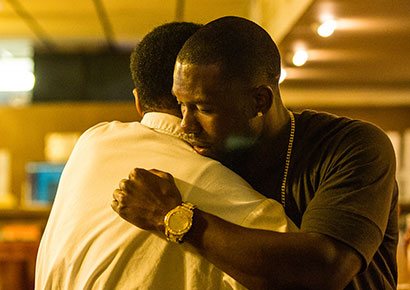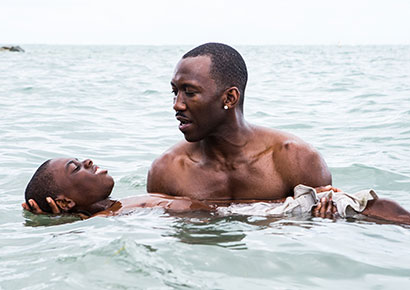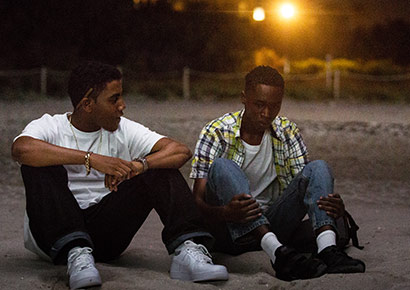Queer film: The roots of Moonlight
 It’s not often that a film like Moonlight – about a black queer experience – makes it to the world’s screens. And it’s even rarer when it wins the Golden Globe for best drama and is nominated for eight Academy Awards.
It’s not often that a film like Moonlight – about a black queer experience – makes it to the world’s screens. And it’s even rarer when it wins the Golden Globe for best drama and is nominated for eight Academy Awards.
Moonlight chronicles the life of Chiron, a young African American man in a tough Miami neighbourhood, from childhood to adulthood, as he comes to grips with his sexuality and his place in the world.
The coming of age film is divided into three chapters and the main character, is played by three actors (Alex Hibbert, Ashton Sanders, and Trevante Rhodes) in different stages of his life.
Created by writer-director Barry Jenkins, Moonlight has wowed audiences and critics with its powerful story and remarkable performances by the ensemble cast, in particular Mahershala Ali (The Hunger Games, House of Cards) as Juan, Chiron’s drug dealing mentor.
Moonlight has its roots in a drama school project by openly gay playwright and Miami native, Tarell Alvin McCraney. The result was a semi-autobiographical short play titled In Moonlight Black Boys Look Blue.
In 2013, Jenkins (who wrote and directed 2008’s Medicine for Melancholy) was looking for a subject for his second film. He came across the play, got in touch with McCraney, and went on to write the film adaptation.
It was purely coincidental but highly significant that Jenkins grew up in the same area that McCraney did, and in which much of Moonlight is set.
“Tarell did a great job of capturing what it felt like to be a poor black kid growing up in the Miami projects,” Jenkins explains. “I saw it as an opportunity to get some of my own childhood memories out of my head and onto the screen, filtered through Tarell’s wonderful voice. The root of his experience was also the root of my experience — it was the perfect marriage.”
 The connection goes deeper: Both men’s mothers also grappled with HIV and substance abuse. While Jenkins’s mother continues to live with HIV, McCraney’s mother passed away from AIDS. Jenkins and McCraney also went on to become artists, treating subjects and themes close to their own experiences, including themes of identity and masculinity.
The connection goes deeper: Both men’s mothers also grappled with HIV and substance abuse. While Jenkins’s mother continues to live with HIV, McCraney’s mother passed away from AIDS. Jenkins and McCraney also went on to become artists, treating subjects and themes close to their own experiences, including themes of identity and masculinity.
In Moonlight Black Boys Look Blue examines the burgeoning gay sexuality of its protagonist Chiron coming of age in a challenging milieu. “It was important to me to show from the beginning how the community is active in Chiron’s life,” McCraney says.
“The community knows things about him before he knows them about himself. People want to place him in a category before he even understands what that means. This happens to all of us, whether we’re male, female, black, white, straight or gay. How we respond to that makes our struggle very real, and deeply influences how our lives unfold.”
Moonlight opens with Chiron at age 10 (nicknamed Little in the movie), fleeing from bullies in his housing project until he is rescued by the drug dealer Juan, who becomes his mentor and unofficial guardian with the help of his saintly girlfriend Teresa.
In the second chapter, Chiron grapples with young love in the form of his teenage schoolmate Kevin, the declining state of his sick mother Paula and a traumatic schoolyard incident that changes the course of his life.
The third chapter follows Chiron in adulthood — now known by his street name Black — contending with the thwarted love that has hindered his identity through his inability to express his feelings.
Casting Moonlight required finding three distinct actors who could convey the same inner feeling across multiple years of Chiron’s life, from age ten and extending into his early 30s.
The filmmakers combed the streets of Miami posting casting notices and going into schools and neighbourhoods to find 12-year-old Alex Hibbert to play the youngest iteration of Chiron. College student Ashton Sanders, 20, was cast as the 16-year-old Chiron, while up and coming actor Trevante Rhodes (Westworld), a former track and field star from Louisiana, was chosen for the older version of the character.
 “I really wanted them to be different people. Same character, different people,” Jenkins told AP. “But there was this spiritual, cosmic connection through the eyes.” Remarkably, the actors never met each other during the filming.
“I really wanted them to be different people. Same character, different people,” Jenkins told AP. “But there was this spiritual, cosmic connection through the eyes.” Remarkably, the actors never met each other during the filming.
One of the most powerful aspects of Moonlight is that it was conceived for the cinema by a straight man, Jenkins, working from material rooted in the personal experiences of an openly gay man, McCraney.
That has helped allow Moonlight’s themes to resonate with anyone who has ever felt out of place in the world. “The script broke my heart,” reveals the film’s producer Adele Romanski.
“Chiron’s story was something I could identify with even as a white female. A lot of people across race, gender, age, and sexuality can identify with feeling ‘other.’ While Moonlight is in essence a gay, black coming of age drama, the core of its story is the universality of its otherness,” says Romanski.
Moonlight is one of the must-see films of 2017. It opens in cinemas on 10 February in South Africa.
Leave a Reply